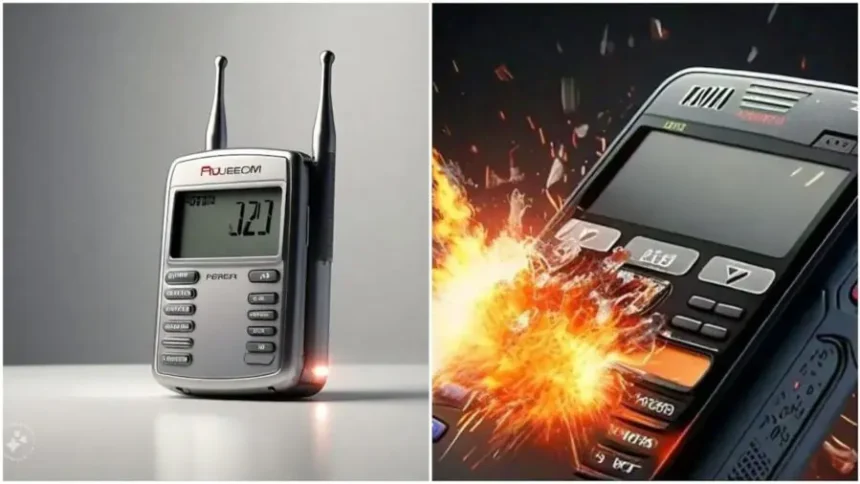After nearly a year of war between Israel and the Iranian-backed terrorist group Hezbollah, Lebanon was sent reeling in September when thousands of pagers and walkie-talkies belonging to Hezbollah members exploded.
Two recently retired senior Mossad agents, who were among those spearheading the years-long operation, detailed the inside story of how they built the devices and got them into Hezbollah hands, shifting the course of Israel’s escalating war with the Iran-backed group. The walkie-talkie and pager plots had a profound ripple effect: weakening Iran by leaving its proxy empire in ruins, with Hezbollah crushed in Lebanon and the Assad regime toppled in Syria.
“We want them to feel vulnerable, which they are,” said Michael, who agreed to speak with 60 Minutes while masked and using a false name. “We can’t use the pagers again because we already did that. We’ve already moved on to the next thing. And they’ll have to keep on trying to guess what the next thing is.”
Weaponizing walkie-talkies
Mossad’s walkie-talkie operation was about waging war through deception and trickery, in line with the spy agency’s motto. Work began on weaponizing the walkie-talkies more than a decade before Israel set them off in September.
“The walkie-talkie was a weapon, just like a bullet or a missile or a mortar,” Michael said.
The walkie-talkie battery, made in Israel at a Mossad facility, included an explosive device, Michael disclosed. The walkie-talkies were designed to go into the chest pocket of a tactical vest for soldiers.
According to Michael, Hezbollah bought more than 16,000 of the exploding devices, some of which were eventually used against them on Sept. 18.
“They got a good price,” Michael said.
The price couldn’t be too low because Israel didn’t want Hezbollah to be suspicious. Mossad also needed to hide its identity as the seller and ensure the walkie-talkies couldn’t be traced back to Israel. So they set up shell companies to infiltrate the supply chain.
“We create a pretend world. We are a global production company: We write the screenplay, we’re the directors, we’re the producers, we’re the main actors,” Michael said. “And the world is our stage.”
From walkie-talkies to pagers
The walkie-talkies were designed to go into armored tactical vests used in battle, but Mossad wanted to plant devices that Hezbollah members would have on them at all times. So, in 2022, the agency began development on boobytrapped pagers, according to former Mossad agent Gabriel, who agreed to speak with 60 Minutes while masked and using a false name. Gabriel said Mossad had learned that Hezbollah was buying pagers from Gold Apollo, a company in Taiwan.
The Gold Apollo pagers were sleek, shiny and could fit into pockets. Mossad needed a larger pager to fit explosives inside, Gabriel said.
Using dummies, Mossad conducted tests with the pager inside a padded glove, held next to the dummy’s face, to calibrate the grams of powdered explosive needed to be just enough to hurt the fighter, but not the person next to him, Gabriel said. The plan was to only hurt Hezbollah members with pagers, not people nearby.
“We test everything, triple, double, multiple times in order to make sure there is minimum damage,” Gabriel said.
The devices had no intelligence capabilities and could not be used for tracking, according to Mossad. They could only be be used as miniature bombs.
“This is a very stupid device by nature. This is the reason they’re using it. There’s almost no way how to tap it,” Gabriel said.
Mossad also tested the pager ring tones. They wanted a sound that was urgent enough to compel someone to take it out of their pocket, Gabriel explained. The spy agency also tested how long it takes a person to answer a pager: on average, 7 seconds.
Convincing Hezbollah to buy the pagers
Gabriel remembers the day he showed the pager off to Dadi Barnea, the director at Mossad.
“And he was furious,” Gabriel said. “He was telling us, ‘There is no chance that anyone will buy such a big device. It’s not comfortable in their pocket. It’s heavy.'”
The director sent Gabriel back to the drawing board, but Gabriel spent the next two weeks successfully convincing his boss of the pager’s merits.
Those merits were later touted in fake ads on YouTube, where the pagers were touted as being robust, dustproof and waterproof, with a long battery life. They posted fake online testimonials, too.
“It became the best product in the beeper area in the world,” Gabriel said.
Mossad did such a good job promoting the pager that people outside of Hezbollah wanted to buy it, Gabriel said.
“Obviously we didn’t send to anyone,” he said. “We just quote them with expensive price.”
Mossad set up shell companies, including one in Hungary, to dupe Gold Apollo into working with it, Gabriel said. The spy agency fully manufactured the pagers and had a licensing partnership with Gold Apollo. It had to all look legitimate to Hezbollah.
“When they are buying from us, they have zero clue that they are buying from the Mossad. We make like the ‘Truman Show,’ everything is controlled by us behind the scene,” Gabriel said. “In their experience, everything is normal. Everything was 100% kosher.”
To further the plot, Mossad hired the Gold Apollo saleswoman Hezbollah was used to working with, who was unaware she was working with Mossad. According to Gabriel, she offered Hezbollah the first batch of pagers as an upgrade, free of charge. By September 2024, Hezbollah had about 5,000 pagers in their pockets.
Setting off the pagers and walkie talkies
The question for Israel was when the sleeping bombs should be activated. There were hints Hezbollah might be getting suspicious of the devices, so Mossad head Dadi Barnea gave the go ahead, triggering the Sept. 17 pager plot. At 3:30 p.m. pagers started beeping all over Lebanon.
Mayhem ensued as explosions went off. Hospitals filled up with the wounded. Limbs and fingers were torn off. People were left blooded, blinded and even with holes in their stomachs. For the most part, the explosions worked as planned, injuring only the people with the pagers, the former Mossad agents said. Several videos reviewed by 60 Minutes show explosions wounding individual people, while leaving those next to them unscathed.
“A day after the pagers exploded, people were afraid to turn on the air conditioners in Lebanon because they were afraid that they would explode,” Michael said. “So there was real fear.”
One day after the pager attack, Mossad finally activated the walkie-talkies that had been dormant for 10 years. Some went off at the funerals of those killed by the pagers.
In all, about 30 people were killed, including two children, in the two attacks. Around 3,000 were injured.
Did Mossad’s plan succeed?
The aim of the walkie-talkie and pager plot wasn’t to kill people, Gabriel said.
“If he’s just dead, so he’s dead,” Gabriel said. “But if he [is] wounded, you have to take him to the hospital, take care of him. You need to invest money and effort. And those people without hands and eyes are living proof, walking in Lebanon, of ‘don’t mess with us.'”
Two days after the pager attack, Hezbollah leader Hassan Nasrallah, known for his fiery oratory, gave a subdued speech. He looked defeated, Gabriel said.
“He already lose the war. And his soldier look at him during that speech. And they saw a broken leader,” Gabriel said. “This was the tipping point of the war.”
In the ensuing days, the Israeli Air Force hit targets across Lebanon, killing over 1,000 people, many of them civilians. On Sept. 27, Israel dropped massive bombs on Nasrallah’s bunker, assassinating him. The Israel-Hezbollah ceasefire took effect at the end of November.
“But I think after this tipping point of the beeper operation and then the walkie-talkie and then IDF attack, [it] put Hezbollah in a situation, a very, very difficult situation: no chain of command, no spirit in their soldiers, asking, begging, for a ceasefire,” Gabriel said.
Michael agreed that wind was taken out of Hezbollah’s sails after the pager operation. He’s hoping it will have an effect on Hamas and the hostage situation in Gaza.
“Because they’re looking at their sides and they’re seeing no one next to them,” Michael said. “They are completely isolated now.”








